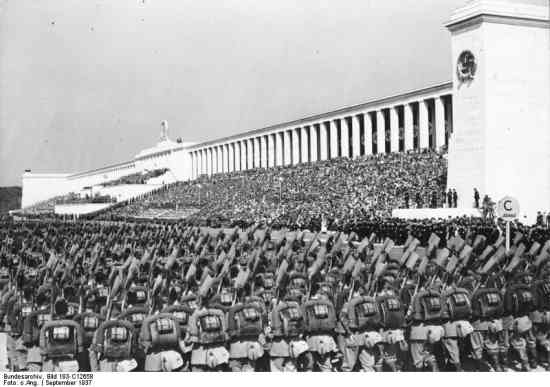What the Germans are like
When you meet the Germans you will probably think they are very much like us.
They look like us, except that there are fewer of the wiry type and more big, fleshy, fair-haired men and women,
especially in the north.
But they are not really so much like us as they look.
The Germans have, of course, many good qualities. They are very hard working and thorough; they are obedient and have a
great love of tidiness and order. They are keen on education of a formal sort, and are proud of their “culture” and their
appreciation of music, art and literature.
But for centuries they have been trained to submit to authority—not because they thought their rulers wise and right, but
because obedience was imposed on them by force.
The old Prussian army—and the Nazi army too—set out intentionally to break the spirits of recruits. They were made to do
stupid and humiliating things in order to destroy their self respect and turn them unquestioning fighting machines. This
method produced a formidable military force, but it did not produce good human beings. It made the Germans cringe before
authority.
That is one reason why they accepted Hitler. He ordered them about, and most of them liked it. It saved them the trouble
of thinking. All they had to do was obey and leave the thinking to him.
It also saved them, they thought, from responsibility. The vile cruelties of the Gestapo and SS were nothing to do with
them. They did not order them; they did not even want to know about them. The rape of Norway, Holland and Belgium was not
their business. It was the business of Hitler and the General Staff.
That is the tale that will be told over and over again by the Germans. They will protest with deep sincerity that they are
as innocent as a babe in arms.
But the German people cannot slide out of their responsibility quite so easily. You must remember that Hitler became
Chancellor in a strictly legal way. Nearly half the German electors voted for him in the last (comparatively) free election
of 1933. With the votes of his Nationalist allies he had a clear majority. The Germans knew what he stood for—it was in
his book—and they approved it. Hitler was immensely popular with the majority of Germans: they regarded him as the restorer
of German greatness. They welcomed the abolition of unemployment although they knew that it arose from conscription and
rearmament. After the fall of France most Germans supported his military conquests with enthusiasm: It was only when they
felt the cold wind of defeat that they discovered their consciences.

Parade des Reichsarbeitsdienstes auf dem Reichsparteitag der NSDAP 1937
Foto: Wikimedia Commons/Bundesarchiv, Bild 183-C12658 / CC-BY-SA
Quelle
The Mind of the German.
The Germans adore military show. In Nazi Germany everyone has a uniform. If it isn't the uniform of the Army, Navy or
Air Force, it is that of the S.A., S.S. or some other Party organisation. Even the little boys and girls have been
strutting about in the uniform of the Hitler Youth or the Union of German Girls.
Such uniforms may still impress the Germans, but they will not impress you. But you must do justice to the position of
the ordinary German policeman. He will have no authority over British troops, but you should do nothing to make more
difficult any task he may be allotted by the Allies.
The uniforms you will respect are those of the British and Allied forces.
It is important that you should be smart and soldierly in appearance and behaviour. The Germans think nothing of a
slovenly soldier.
You will run across Germans who are genuinely ashamed of being Germans. Even before Hitler made Germany universally
hated, they had a sense of national inferiority. They felt that other nations, like the British, Americans and French,
were somehow ahead of them. There is little doubt that Hitler realised this, and used his theory of the Master Race to
overcome it. He tried to make the Germans think well of themselves, and he overdid it. There will be some—especially the
Young ones—who have swallowed the tale that they are members of the Master Race, and are therefore our superiors.
There is no need to say much more about German brutality; it has been unmistakably revealed in the Nazi methods of
governing and of waging war. But you may think it strange that the Germans are at the same time sentimental. They love
melancholy songs; they easily get sorry for themselves; even childless old couples insist on having their Christmas tree.
German soldiers would play with Polish or Russian children, and yet there are enough authentic reports of these same
children being shot or burnt or starved to death.
This mixture of sentimentality and callousness does not show a well-balanced mind. The Germans are not good at
controlling their feelings. They have a streak of hysteria. You will find that Germans may often fly into a passion if
some little thing goes wrong.
Herausgeber: Landesbildungsserver Baden-Württemberg
Quelle: https://www.schule-bw.de
Bitte beachten Sie eventuell abweichende Lizenzangaben bei den eingebundenen Bildern und anderen Dateien.


